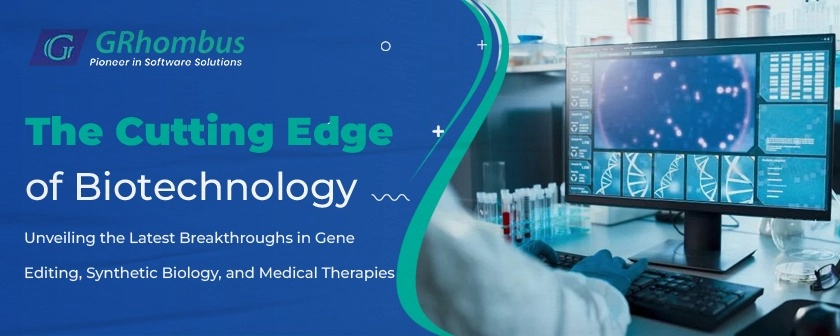Biotechnology is a rapidly evolving field that blends biology with technology to develop innovative solutions for a variety of sectors, including healthcare, agriculture, and environmental management. This blog delves into the latest advancements in biotechnology, focusing on CRISPR gene editing, synthetic biology, and new medical treatments and therapies.
CRISPR Gene Editing
CRISPR-Cas9 is a groundbreaking gene-editing technology that has revolutionized molecular biology. It allows scientists to alter DNA with high precision, making it possible to add, remove, or modify genetic material at specific locations within the genome.
Recent Breakthroughs
CRISPR for Disease Treatment
- Sickle Cell Disease and Beta-Thalassemia: Clinical trials have demonstrated the potential of CRISPR in treating genetic blood disorders like sickle cell disease and beta-thalassemia by editing hematopoietic stem cells.
- Duchenne Muscular Dystrophy: Researchers are exploring CRISPR to correct mutations in the dystrophin gene, offering hope for patients with this debilitating muscle disorder.
CRISPR Diagnostics
COVID-19 Detection: CRISPR-based diagnostic tools, such as the SHERLOCK and DETECTR platforms, have been developed for rapid and accurate detection of SARS-CoV-2, the virus responsible for COVID-19.
Agricultural Applications
Crop Improvement: CRISPR is being used to develop crops with enhanced traits such as drought tolerance, pest resistance, and improved nutritional content. For example, CRISPR-edited rice varieties have been created to resist bacterial blight.
Synthetic Biology
Synthetic biology involves designing and constructing new biological parts, devices, and systems or re-designing existing biological systems for useful purposes. It combines principles from engineering and biology to create new functions and applications.
Recent Breakthroughs
Synthetic Microbes
- Biofuel Production: Researchers have engineered microbes to produce biofuels more efficiently, offering a sustainable alternative to fossil fuels.
- Bioremediation: Engineered bacteria are being developed to clean up environmental pollutants, such as oil spills and heavy metals, from contaminated sites.
Synthetic Organisms
- Xenobots: Scientists have created the first living robots, known as xenobots, from frog cells. These programmable organisms can move, heal themselves, and even exhibit collective behavior, opening new possibilities for medical and environmental applications.
- Biosensors: Wearable Health Monitors: Synthetic biology has led to the development of biosensors that can be integrated into wearable devices to monitor health parameters like glucose levels, dehydration, and even stress.
New Medical Treatments and Therapies
Biotechnology has led to significant advancements in developing new medical treatments and therapies, improving patient outcomes and offering hope for previously untreatable conditions.
Recent Breakthroughs
Gene Therapy
- Luxturna: The first FDA-approved gene therapy for an inherited retinal disease, Luxturna, delivers a normal copy of the RPE65 gene directly to retinal cells, restoring vision in patients with Leber congenital amaurosis.
- Zolgensma: This gene therapy treats spinal muscular atrophy (SMA) by delivering a functional copy of the SMN1 gene, which is defective in SMA patients.
Cell Therapy
- CAR-T Cell Therapy: Chimeric antigen receptor (CAR) T-cell therapy has shown remarkable success in treating certain types of blood cancers, including leukemia and lymphoma, by reprogramming patients’ T-cells to target and kill cancer cells.
Personalized Medicine
Cancer Immunotherapy: Advances in biotechnology have led to the development of personalized cancer vaccines and checkpoint inhibitors that harness the body’s immune system to fight cancer more effectively.
Conclusion
The field of biotechnology is advancing at an unprecedented pace, with CRISPR gene editing, synthetic biology, and new medical treatments and therapies leading the charge. These breakthroughs not only offer new hope for treating genetic disorders, cancer, and other diseases but also pave the way for sustainable environmental solutions and innovative applications across various sectors. As research continues to evolve, the potential for biotechnology to transform our world seems boundless.
